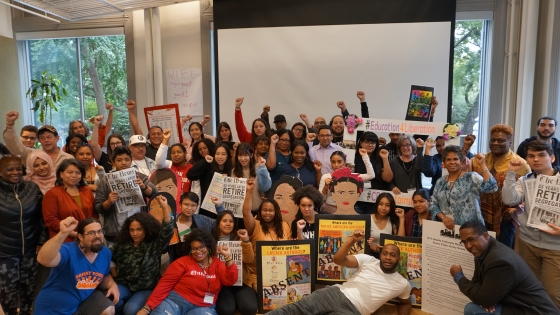Pre-Work For Participants
- NYCDOE CRSE Definition
- Our Culture Our Schools
- CRSE Guidebook
- Journaling: This activity is modeled after Hazel Symonette’s “Calibrating as a culturally responsive evaluator”, to help non-evaluators/people position themselves. Her work is based on a quadrant system that can be simplified.
1. Inside/In:
What is my vision of who I be/am becoming? Who do I think I am?
3. Outside/In:
How am I perceiving others as perceiving/receiving me? Who is my “Us,” am I part of the “we” or the “they?” How do I think my students, families, and communities perceive me? Who belongs? Who is entitled to the space “We” share?
2. Inside/Out:
How am I showing up in the educational context? What is the situational context calling for from me? Am I working with or on people? How do I know this?
4. Outside/Out:
Whose ways and agenda matter? Who authorizes and decides that?
Opening Community Circle (10 minutes)
We discussed what anti-racism looks like in all areas ideological, institutional, interpersonal and internalized. What is one action you took since our last time together to work toward BIPOC and LGBTQ+ Liberation? How did it feel? This can be an external action or an internal one.
Community Agreements (10 minutes)
Reread the community agreements, participants share in a circle one that they want to push themselves to commit to today. Facilitator can read aloud the poem, Brave Space.
Culturally responsive-sustaining education...is a way of seeing diversity as a source of knowledge.
Discussion: RTWT Protocol (50 minutes)
We will use today to learn about the specifics of CRSE. There are a lot of misconceptions about what it is and who it is for. We will engage in conversations as we unpack what it is and look to understand the relationship between that and anti-racism. We will unpack the definition of CRSE that is used by the NYCDOE.
- What words stand out? Why?
- What is CRSE? What does it look like/ sound like in a school or classroom (in person or virtually)?
- You can refer to the CRSE Guidebook for more examples
- What relationships do you see between anti-racism and CRSE? How are they connected?
CRSE In Practice (15 minutes)
- How does CRSE live in your classroom or school today? What evidence do you see of it?
- What shifts can you make to integrate CRSE into your classroom or school?
- Note to facilitator: Focus more on this part of the discussion
Key Takeaways
- Culturally Responsive-Sustaining Education (CRSE) advances equity and social justice by:
- Centering and valuing students’ cultures and identities
- Using rigorous and relevant curriculum, and anti-oppressive teaching practices
- Building strong, positive relationships between students, families, and staff
- Supporting students to develop the knowledge, skills, and vision to transform the world toward liberation
- Scholar Gloria Ladson-Billings highlights three core components of CRSE:
- Academic achievement: CRSE is academically rigorous and has been proven to increase academic excellence.
- Cultural competence: Educators and school staff understand culture and its role in education. They critically reflect on their own identities and privileges in order to relate to and understand their students.
- Sociopolitical consciousness: Educators and school staff address the personal and sociopolitical issues that impact students’ lives, and create an environment in which students see themselves as agents of social change and transformation.
- Culturally responsive-sustaining education is a part of every aspect of a student’s education including culture, curriculum, instruction, school climate, and family and community engagement.
Reflection: Journal (7 minutes)
- What is something you are learning that is challenging your thinking or beliefs? Affirming your thinking/beliefs?
- What is one action I/we can commit to doing after this session to work toward BIPOC and LGBTQ+ Liberation?
- What is one action I/we can commit to stop doing after this session to work toward BIPOC and LGBTQ+ Liberation?
Closing Community Circle (7 minutes)
Pick one of these to share as you go around the circle.


